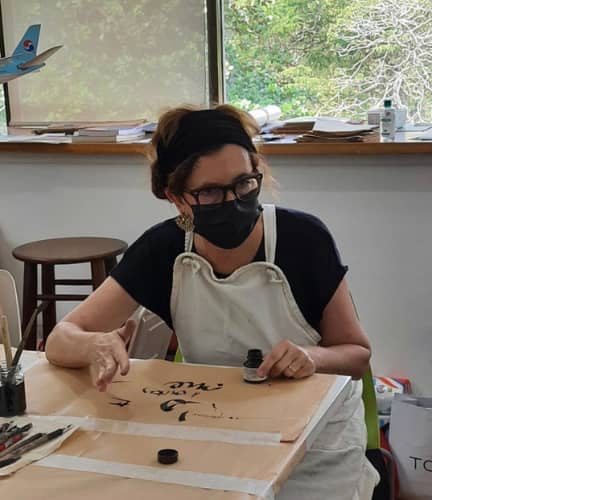
May 02 2022.
views 305Today in 'Inside Story' we feature Belgium-born Fabienne Francotte whose works combine social, emotional, and spiritual experiences; the vivid narrative of an expatriate, teacher, and observer. Francotte studied Calligraphy at Maison du Livre in Brussels, whereby the careful composition of writing demanded a strict, ritualistic approach built on strong gesture and balance. Her portraits are about the characteristics of class, gender, and race. They are a tale of the daily struggle showing distinctive appearances, expressions, and gestures. Her people are every day and anonymous. The artist moved to Sri Lanka in 2016 after which she began engaging and communicating conflicting issues in Sri Lanka today: school and education, dreams and weddings, sex and business, silence and fear, courage and dedication, as well as religion and tolerance. Her works are often surveys of her surroundings and environment.

Q How did calligraphy and dance contribute to and influence your final destination as an artist?
Dance and Calligraphy were part of my artistic education. These became passions and long hours of work and discipline. Later in my adult life, writing became drawings. We can say that the black line is a driving force and mark-making.
Q What is it about Art that most appeals to you?
The freedom to create. It allows the intensity of the emotions and the sharing with others. It is another language. I like the physicality of the forms and the surprise we got. Art is a feeling under our skin.
Q What aspects do your Art deal with?
Existentialism – it is all about human beings and being human. It is harbouring vulnerability, daring to say, inviting to think, it is about darkness and light. It is about life.
Q Do you find that Art gives you an extra sensitivity as a person and greater empathy with people?
I think the extra sensitivity was there from the beginning. I started to write diaries in 1972 gathering thoughts, experiments, images, photographs, and drawings of course. When I reread these pages, I am still that person.
Art is a different way that I found of expressing empathy but all my years as a teacher developed my wish and ability to listen to people.
Q Does your husband support you in your work and does he influence your work in any way?
Yes, he is very supportive and he followed me when I decided to come back to Sri Lanka for my art projects – after his posting as EU Ambassador. I am a lucky one! But he doesn’t influence my work at all. He respects my work even when the outcome is not always to his taste.
Q Having lived in many countries what made you settle down in Sri Lanka?
The people. Their big heart. The many communities. The landscape, the jungle, the ocean. Sri Lanka offered me a place among the art community and we also shared many issues in SL during the last six years. We shared peaceful years, we shared bombings and we are sharing the everyday life as well.
Q As a woman, has your Art helped other women to find themselves, express themselves and stand up for themselves?
It has. It helps. Drawing is thinking and thinking is moving. Art has the magic to embark people. Art offers us a space where to deposit our thoughts, our dreams, and our pains. We all have the ability to draw and experiment with marks on paper allows a kind of freedom and a private place.
Q Do you think that women in the East are moving forward in their quest for equality, independence, and respect?
I think they are. They are facing a constant struggle to keep their territory and improve their living conditions in this dehumanized world. Women have been facing many issues but I think they are pretty united all over the world.
Q Do you enjoy conducting workshops on Art?
Not on art but art workshops – yes. It is always a special moment where we all share our energy and secrets. Resonating together creates bridges – this is all we need.
Q Would you recommend Art as a form of therapy for depression, isolation, or any form of mental or physical illness?
Definitely. It is proved and it is used more and more nowadays. I am not an art therapist, I don’t make conclusions about the drawings of others, I am only allowing them to have a surprise on the paper or while shaping clay with their hands, or writing a few lines. Individual attention is part of these sessions.
Q What have you gained and benefitted most from Art and how has it helped you develop as an individual?
I am self-taught, I started to draw when I was 42. Anything can happen! I found a place where to grow, I developed myself using human potential, and I gave a voice to others. Signs of life to share with people are a way to survive. Like a promise.
Q What are your views on life, love, and marriage?
I love life, I love my life and I love my husband.
Q Do you advocate same-sex relationships?
I think love is beyond categories. It doesn’t matter who we choose as a partner but it matters to be loved.
Q Do you believe in life after death?
Not at all. And if there is one, it will be great again.
Q Are you religious?
No. No more. I was baptised, I was a Catholic. I believe in people. Not in gods.
Q What are the most important qualities a human being should have?
Many and more. Empathy. Courage. Authenticity. Kindness.
By Anusha David
0 Comments